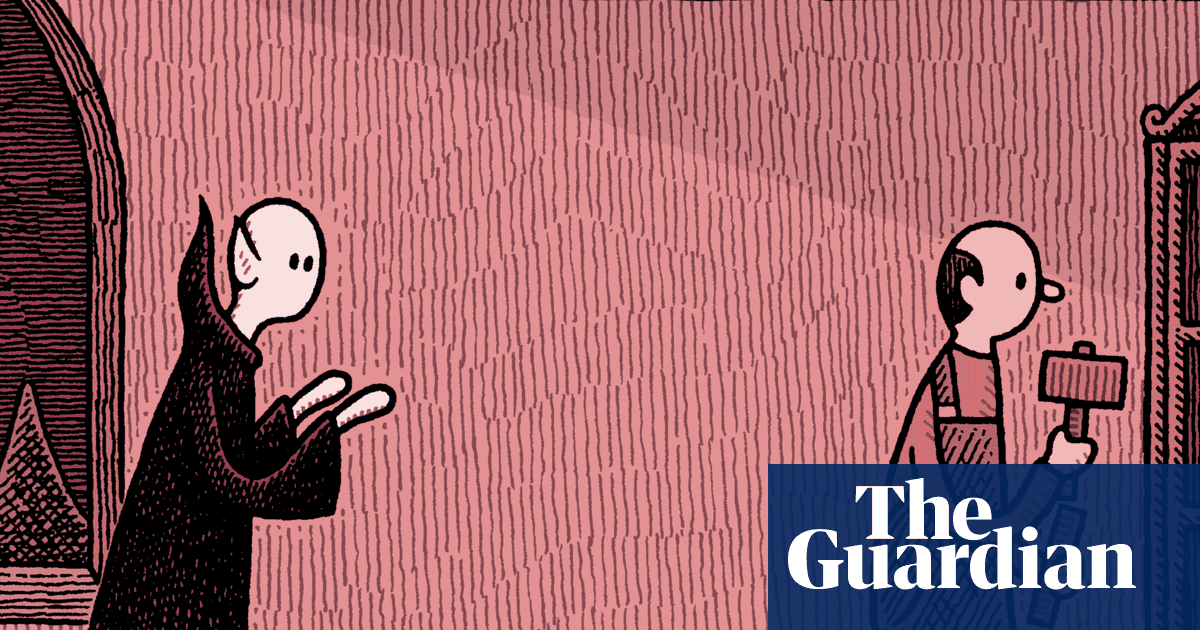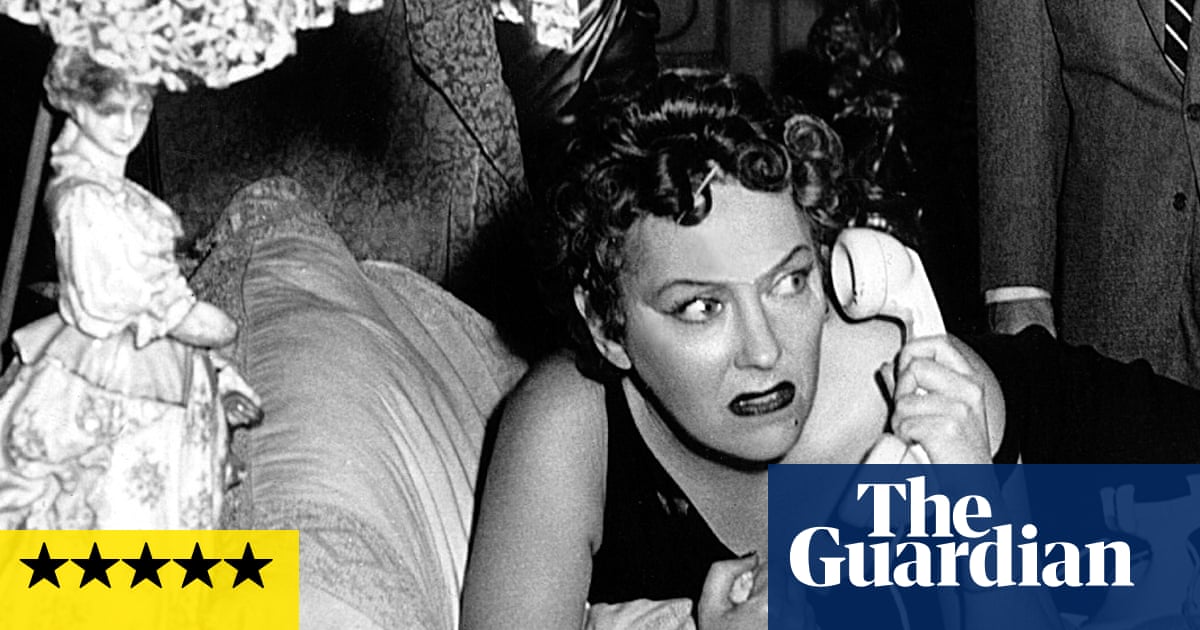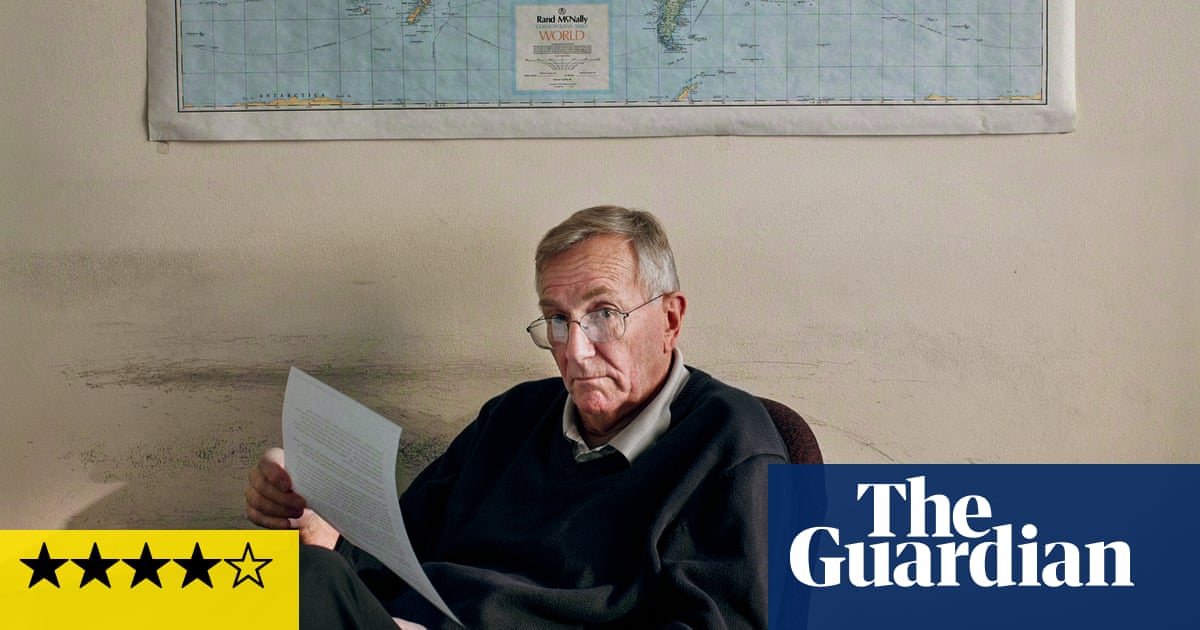The bronze statue of Margaret Thatcher by the sculptor Douglas Jennings has a rating of 2.8 out of five on Google Maps. Although curiously, none of the reviewers seems to have overly preoccupied themselves with the quality of the craftsmanship or the fidelity of the likeness. “One of the most important PMs this country ever had,” writes one. “It’s a public toilet but there’s nowhere to wash your hands,” writes another.
The statue was originally commissioned more than a decade ago, and was intended to stand in front of the Houses of Parliament, but Westminster city council rejected it on the grounds that it might become a target for vandalism. Instead, it was offered to her birthplace of Grantham, a town she left at the age of 18 and rarely visited again. Within hours of its installation, someone threw an egg at it. Shortly after that, it was defaced with red paint. And now, on a grey October afternoon, Margaret Thatcher herself is gazing upon it, bearing a look of pure disgust.
“They’ve got the date wrong,” she moans, her trademark handbag sliding down a blue-sleeved arm pointed accusingly upwards. “It says I died in 2013. As you can see, I am very much alive.”
The presence of Thatcher in her home town, on what would have been her 100th birthday, has drawn a small crowd outside the town’s Guildhall Arts Centre. Motorists toot horns; fans want selfies; passersby occasionally flick V-signs from across the street. A middle-aged woman approaches and clasps Thatcher’s hands in her own. “I just want to say, if it weren’t for you, I would never have been able to buy my house.”
“That’s wonderful,” Thatcher replies. “And are you still living in the house?”
“No,” the woman says. “I sold it to my son.”
Somehow it scarcely matters that the figure they are venerating and vilifying is not Thatcher at all, but an actor named Matt Tedford, who plays the former prime minister in a riotous drag show called Margaret Thatcher: Queen of Soho, which played at the Guildhall on Monday night. In the show, Britain’s first female prime minister is depicted walking the streets of London on the night before the section 28 vote in parliament in 1987, stumbling upon a gay bar and ultimately reinventing herself as a disco diva. It’s sharp, topical, ridiculous and very funny.
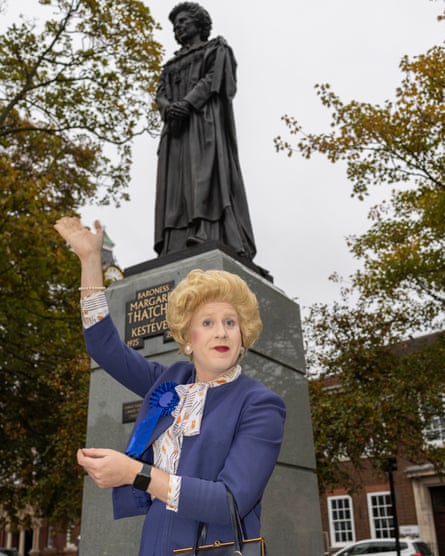
Tedford has been portraying Thatcher for 12 years – “longer than she was prime minister”, he observes wryly. The role has taken him to some strange and random places. He’s met party leaders. He’s been for dinner at the Foreign Office. He’s shared a stage with Kemi Badenoch at a book launch. For a character that began life as a gaudy Halloween costume around the start of the last decade, it’s been quite a ride. As he puts it: “I always say I’m the only northerner she ever gave work to.”
Now his work has brought him to Thatcher Fest: a clever wheeze cooked up by Grantham’s local councillors to commemorate the centenary of its most famous daughter. There are talks and walks, Thatcher-themed music nights and exhibitions of memorabilia, Gyles Brandreth giving a lecture on Thatcher’s unlikely connection to Winnie-the-Pooh, exhibitions of her exercise books at the local school and newspaper clippings at the library.
It’s attracted all sorts: Queen of Soho was uproariously received by a largely progressive crowd, while the true-blue diehards packed out the Guildhall for a talk by Edwina Currie, asking reliably bone-headed questions about what Thatcher would have made of “today’s political correctness”. Not everything has been a riotous success: one of the walking tours at the weekend attracted just five people. But for a small town known to most as a stop on the East Coast Main Line, it is the spotlight they crave.
“Grantham has never had as much publicity as it has this week,” boasts Ashley Baxter, the independent leader of the local South Kesteven district council. “Having Queen of Soho upset the Conservatives. Having a Thatcher Fest at all upset the left. We’re upsetting all the right people. Which is only right, because people are still … very emotional about her.”
On a wider level, the anniversary has been marked with the usual spume of reassessment, revisionism, tie-in content and outright silliness. The phrase “whatever you thought of her politics” has been flogged to within an inch of its life. At the recent Tory conference in Manchester, their former leader was a weirdly pervasive, almost phantasmagorical presence in the hall: cardboard cutouts, a photo mosaic, an AI Thatcher, her outfits displayed in a glass case. There has been a new book alleging that she had two extramarital affairs, a birthday gala dinner in London, an Unherd article on Thatcher’s “erotic power” that describes her as “a nursery dominatrix, thrashing grown-up little boys who confuse punishment with love”.
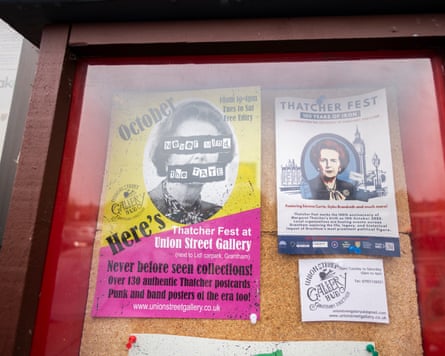
More than three decades after she left politics, it seems there are still plenty desperate to reanimate her by incantation. And there is a certain irony here, for during her time Thatcher was largely uninterested in furnishing the iconography or cult of personality that grew around her: a life, as her biographer Charles Moore observed, “unexamined by the person who lived it”. She was unmoved by questions of legacy, never kept a diary, threw away huge piles of her documents. She wanted to be consequential. But she was never overly fussed about her place in history.
And so what remains of Thatcher today is essentially a palimpsest; a dirty print of projected feelings and half-remembered catchphrases, slavish adoration and bogeyman hatred. This is doubly true for subsequent generations with no actual memories of her. “You meet lots of young people who think they should hate Thatcher, but don’t necessarily know who she was, what effect she had on their lives,” says Tedford. “They know she closed the mines. They know about the milk. There’s a remove there, where we’ve been able to appraise her differently to a generation who grew up with her as a present-tense villain.”
Naturally enough, current politics also intrude here, as Thatcher’s old party stands on the brink of collapse, as traditional institutions lie in ruins, as a surging far right evoke her memory while simultaneously running from her libertarian brand of small-state economics. And of course it is only natural to wonder what she would have made of the rise of Reform and open blood-and-soil nativism, the St George’s flags brandished forebodingly from the upstairs windows of Grantham’s narrow terraced houses. Is this what she wanted? Is the new far right a continuation of Thatcherism, or a reaction against it?
“Thatcher remains part of Grantham’s story, and rightly so,” says Ben Green, a Reform councillor who defected from the Conservatives this summer, in an email. “But the challenges we face today are very different from those of the 1980s. Her reforms revived enterprise but left too many industrial towns behind. In my view, the country now needs a more patriotic and muscular state: pro-enterprise, yes. But also pro-community.”

Moore doesn’t, on a point of principle, answer hypotheticals about what Thatcher might have done or believed today. But there are elements of Reform’s current appeal that, he suggests, did not chime with hers. “She was not interested in racial stuff at all,” he says. “And of course she was completely against repatriation, which she thought was inhumane, and also sort of nonsensical.”
Back in Grantham, Currie has just finished giving a talk on Thatcher and feminism to an audience of enraptured diehards and a few dozen extremely bored-looking schoolchildren on a field trip. Baxter, the council leader, is in his office reflecting on Thatcher’s true legacy in the town. And for all its gilded heritage, this is a place with largely familiar issues: closing shops, a shortage of housing, a shrunken civic life, a basic absence of identity. “My colleagues will walk down the London Road and say: ‘Oh, that used to be a machining place. That used to be a factory. That was where so many people worked.’ But this is the story of the UK.
“Then on the high street, you’ll see we’ve got our fair share of empty shops,” Baxter continues. “We’re trying to put works of art into them. And because of Thatcher, and the subsequent austerity governments, you’re only allowed art by stealth. If I said tomorrow we needed an arts officer on a salary of £30,000, the answer would – correctly – be that we haven’t got any money. Same with leisure. I’m in this job because the Tories shut down my local leisure centre in 2021 and we’re trying to find a way to reopen it.”

Perhaps the most generous view of Thatcher is that she was a prime minister with no real concept of the long-term consequences of her actions. Perhaps she genuinely did believe that her wave of liberalisations would secure the greatest comfort for the greatest number, a little patriotic paradise in which everyone would own their own house and a little nest egg in British Telecom shares. Perhaps she failed to properly anticipate the storm of globalisation, the way it ripped the soul out of communities and created a staggering concentration of wealth among a very few. Perhaps you might even argue that, given the prevailing global currents of the 1980s, if it wasn’t Thatcher, it would have been someone else.
But, of course, it was Thatcher, a naturally combative politician who saw ideological enemies at every turn, urgent and angry and unafraid of disruption. And perhaps the real legacy of her time is the death of the principle that we could all somehow prosper together. More than any other figure in our lifetime, Thatcher embedded the idea that our own circumstances can only ever be improved at the expense of someone else, by picking the right side and fighting for eternity, the politics of envy and cruelty and vindictiveness baked into our electoral calculus. You will be fine, because others will not.
Perhaps this is why on some level people still want her to be real, to berate her or whisper sweet nothings in her ear, and are prepared to elide the infinite layers of makeup, artifice and literal death in order to do so. But of course the woman herself has largely disappeared from view. You can’t throw an egg at deregulation. You can’t hurl paint over decades of rising house prices. The devastated former industrial towns of the north, the Midlands, Scotland and Wales possess precious little erotic dominatrix power.
Back to Grantham rail station we go, past the statue of another local hero, Isaac Newton (Google rating: 4.7), dodging the four lanes of traffic and a deregulated local bus as we cross the road outside the big Wetherspoons. On the other side, a shuttered cafe sits alongside a branch of the local estate agents, the latter staffed by young men and women wearing suits and headsets. Thatcher’s old school is now an academy. The station car park is now run by a private firm and charges £5.45 for 24 hours. Inside the station there is a choice of Costa or Starbucks. Maybe Tedford was right after all: it says she died in 2013, but as you can see, she is very much alive.

.png) 1 month ago
50
1 month ago
50




